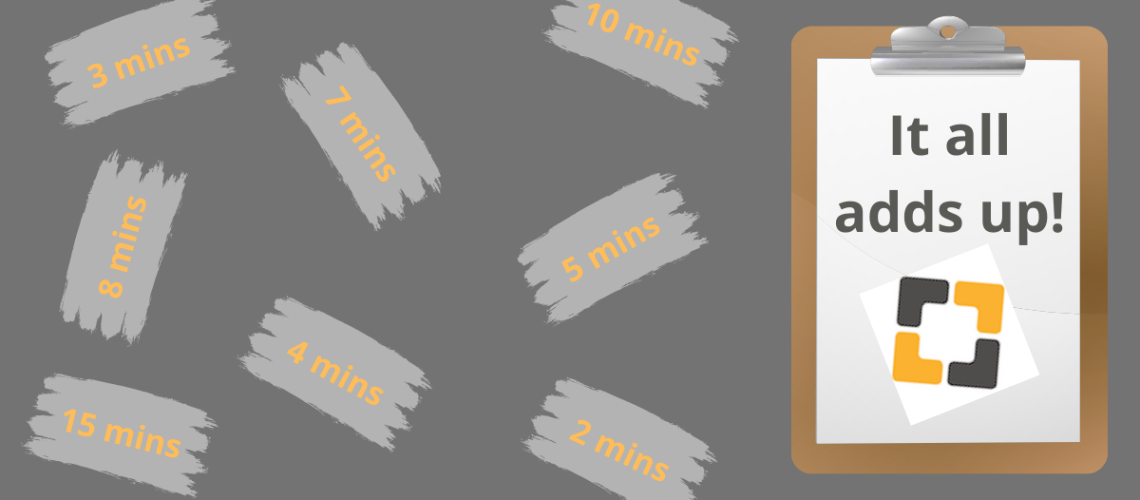One of the things that we often encounter in businesses we visit is DISORGANISATION – sometimes it’s the boss, sometimes it’s the team members individually, sometimes (but fortunately, not very often) it’s everyone. Other times it’s the office or workshop environment that creates the opportunity to be disorganised rather than the people themselves, but one way or the other, not being on top of things can be very disruptive.
If this is you, or any of your team, then please read on‚ and share with any of your team that you think might benefit.
Do you waste much time during your day due to disorganisation? Perhaps you spend five minutes searching for a misplaced file, another five looking for an email that you know you kept “somewhere”, and perhaps five more finding some other important piece of paper, lost in the piles of all the other pieces of papers on your desk (or the piles of electronic “stuff” on your computer).
For desk, read workspace, office, tool-shed or whatever – these points apply to all workers whether fully desk-bound, or in a workshop, or out in the field. Being well organised isn’t just an office “thing”.
All those five minutes add up – before you know it, you’ve spent an hour throughout the day looking for things you can’t find. And that’s just one day! Even if you only lose 5 minutes a day, that adds up. It’s over 20 hours in a normal working year. (And it can be worse – 15 minutes lost time a day tallies up to 60+ hours a year – gone! Just like that)
If your staff asked for an extra week and a half off on holiday, would you let them have it?? They already get 4 weeks annual leave and a growing number of statutory days as well – so another week or more’s “unauthorised absence” starts to hurt doesn’t it?
Many people struggle with disorganisation. And, while some think they can succeed amidst the chaos, this disorganisation can end up costing a high price. It certainly affects productivity, it can impact creativity and output, it ruins effectiveness, and it definitely adds stress to our lives.
Here’s a few brief tips that might just assist:
- Use a Notebook – somewhere to jot down all those things you think you’ll remember during meetings and phone calls, but possibly don’t. The modern staff member probably would say “use the Notes function on your phone”. And I’d say, well maybe, but old fashioned as it might be, a notebook that you’ve hand written in yourself will work just as well. Either way, just do something! Think of all the mental energy you’ll save by not have to remember everything in your head.
- Clear your desk – if there are files or papers on there that you haven’t actually looked at for weeks, then the chances are you never will. But you don’t have to throw them away – put them in a file in a drawer marked “Stuff to Read Later”‚ and then see if you ever do. And see if your career is impacted at all if you don’t.
- Create an Action Area on your desk – just the items you need right now, for the current task you’re working on. And when you’re finished that task, put all the remaining paper work away in a logical place where you can access it later if necessary, because if you don’t tidy it away, it later becomes part of the “Clear your Desk” action above.
- Keep key items handy – the more often you use something, the closer to hand it should be. This covers everything whether it be a file, the printer, or your stapler! Arrange your workspace for usefulness, not for the way it looks.
- Use Digital Planners and Systems – many of the notes above refer to paper based systems because, no matter what the doomsayers told us when PCs were first introduced to our lives, we do not yet live in a completely paper-less society! But electronic systems also help us be organised, especially if they are used well. Make use of the colour coding that comes with many programs, perhaps to separate key work tasks from personal errands for example; or to prioritise all items into urgent, medium-priority and low-priority; or to sort and prioritise your emails. Make sure your electronic “file tree” is as well organised as your tidy desk, or efficient filing cabinet, is – it doesn’t matter whether you are searching for a physical piece of paper, or an electronic file you know you “put somewhere where you wouldn’t forget it”, the principles are the same. A nice tidy logical filing system works wonders and saves time! It doesn’t matter what system you use – just use a system of some kind. You won’t regret it!
These are all pretty simple tips, but the amazing thing is that in this sort of discussion, it’s usually the simple things that are the most effective. And no matter whether you’re entirely paper based in your systems, or fully digitised so to speak, the key points remain the same:
- Have a clean and tidy approach
- Use the tools within whatever system you use to make life easier
- Keep what’s most necessary closest at hand
- If you don’t need it, get rid of it!

